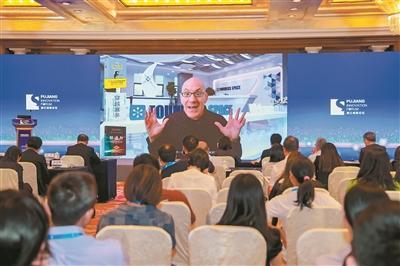2025 Pujiang Forum: Cultivating Fertile Ground for Innovation

The Innovation Culture Forum was a highlight of the 2025 Pujiang Innovation Forum for its timely discussion on the role of culture in technological advancement.
Organized by Science and Technology Daily (S&T Daily), the Chinese Academy of Science and Technology for Development (CASTED), and the Shanghai Institute for Science of Science on September 21, the forum brought together experts to explore "innovation culture in an era of transformation."
From Silicon Valley to 'Silicon Alley'
Wu Jing, president of S&T Daily, emphasized that innovation culture should be built on five pillars: scientific rigor, exploration, collaboration, mentorship, and humanistic values. "The media should not only be the recorders and disseminators of innovative practices, but also strive to become the advocates and nurturers of an innovation culture," she said, underlining the media's role in shaping such culture.
Liu Dongmei, party secretary of CASTED, defined innovation culture as beliefs and habits that encourage inclusivity and participation in innovation. Liu warned against oversimplifying its role and stressed the need for open regional strategies. "Openness is crucial in building a regional innovation culture," Liu said. "This involves building networks with leading innovation regions, studying external experiences and models, and achieving innovative transformation through interaction and mutual learning." See page 2
Shanghai and Hangzhou were cited as examples of regions blending innovation with urban life. "The traditional Silicon Valley model usually isolated innovation in suburbs, but now we see 'Silicon Alley'—integration into the city," said Sheng Shihao, chairman of the Zhejiang Federation of Humanities and Social Sciences Circles. He highlighted how young entrepreneurs are redefining innovation: "They are 'definers', not 'followers'."
AI reshaping innovation paradigms
With China producing over 26 percent of the world's data and leading in AI patents, the forum also addressed AI's cultural impact. Zhang Zheng, senior principal scientist at Amazon Web Services (AWS) and director of the AWS Shanghai AI Institute, suggested tapping into "dark data"—logical mathematical and code texts—to train AI in reasoning and analytical capabilities, enabling it to explore complex solution spaces.
While demand for AI talent is surging, reports indicate a shortage of five million professionals in China, with algorithm engineer job postings growing 44 percent year on year. "We need people who can collaborate with AI, not be replaced by it," Zhang said.
Ji Xiaohua, founder of Guokr, an Internet content provider for science and technology education, said AI is making innovation more participatory. "When AI-generated content puts the 'wand of creation' in everyone's hands, the public evolves from consumers to co-creators," Ji said. "When rational questioning, hands-on verification, and open collaboration become social habits, innovation becomes part of our national spirit and era ethos."
While AI accelerates research, concerns about "academic garbage" persist. "In the AI era, maintaining research integrity is key," said Saskia Steinacker, chief digital officer at Springer Nature. "New tools help detect problematic documents more quickly and effectively. Technology is an enabler—the goal is to empower researchers, build trust, and drive meaningful impact."
Building an innovation culture ecosystem
Global perspectives were also shared at the forum. "Innovation starts with leadership," said Steve Hoffman, founder of Founders Space, a leading incubator for startups, in his video message. "You must shift mindsets and change how you interact with teams and clients."
Hoffman, known as the "godfather of Silicon Valley venture capital," stressed the importance of identifying inherently innovative individuals. "They may be disruptive or even hard to deal with, but supporting them can drive organizational innovation," he said.
"To develop science and technology, we must cultivate innovation culture in Chinese soil with a 'tradition of curiosity'," said Tong Shijun, president of New York University Shanghai. He advocated combining wonder with concern, blending knowledge pursuit with practical application, and integrating "what people do," "what people have," and "what people are" to harmonize curiosity with Chinese culture.






